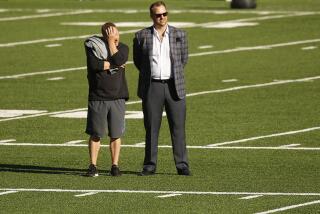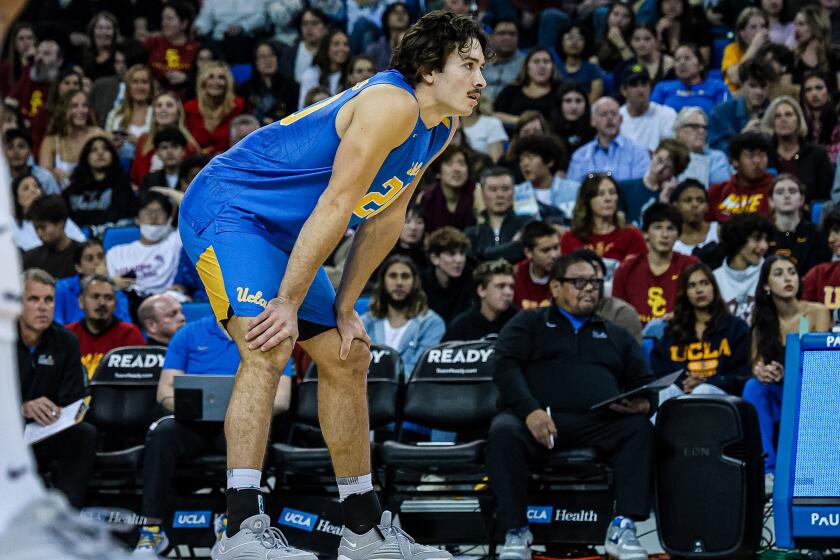Funeral of a Soccer Player Unites a Tearful N. Ireland
Protestant and Catholic, nationalist and unionist, Northern Ireland stood united in grief Saturday as tens of thousands of mourners said goodbye to soccer legend George Best.
As his coffin was taken from the family home in east Belfast, a silence fell over those who lined the streets of this gritty city where the man whom many described as Britain’s greatest footballer grew up.
Attendance at the funeral fell well short of the 500,000 that some had predicted. Nevertheless, the ceremony represented a unifying moment for Northern Ireland. Best, a sportsman and playboy who grew up in a largely Protestant housing project here, was a rare representative of the province, transcending the violence-racked divisions between Protestants loyal to British rule and Catholic nationalists who have fought against it.
“In the eight days since Best’s death, Northern Ireland has talked of little else, and the memories of ‘Georgie’ have united Protestant, Roman Catholic and dissenter in a manner that has eluded all the efforts of church and state,” reported the Times of London newspaper.
The crowds of mourners lining the streets and at the funeral were estimated at 50,000 to 100,000. Perhaps a million more people watched the ceremony live on television, making it the largest funeral ever in Northern Ireland, which has a population of 1.6 million, and one of the largest in Britain. For some, the public outpouring of grief in the days since his death at 59 recalled the mourning after the death of Princess Diana in 1997.
Known for his athleticism and good looks, Best thrilled fans for the 11 years he participated in league play, mostly for Manchester United, which he joined in 1963 when he was 17.
But he made as much news off the field -- as a ladies’ man, a witty and self-deprecating superstar, and a hard drinker. The precursor to modern-day celebrity athletes such as David Beckham, Best once said he should be credited with taking soccer off the back page, the traditional spot for sports coverage, and putting it on the front.
But in later years, there was an aura of sadness around him too. One famous anecdote had him in a luxury hotel room, surrounded by the remains of a champagne-soaked night, his bed linens strewn with half-forgotten cash as a room-service waiter asked: “George, where did it all go wrong?”
He struggled for decades with alcoholism, which led to the breakup of his two marriages. His liver was so damaged that he needed a transplant in 2002. But he resumed drinking even after the operation.
In the end, none of his troubles dimmed the affection his fans held for him. People openly wept as the funeral procession made its way in the rain to Stormont, the seat of the now-suspended Northern Ireland government. There, an estimated 32,000 people gathered to pay their respects.
“I haven’t stopped crying since he died,” said neighbor Paul Coulter. “He truly was the best, both on and off the pitch,” he said, referring to the soccer field.
About 300 VIP guests from the worlds of sports, politics and entertainment attended the ceremony, where Best’s sister Barbara McNarry described him as a “super brother” and “my hero.”
Thanking everyone across the world for their thoughts and prayers, Calum Best choked back tears as he read two poems for his father.
Television personality Eamonn Holmes, a friend of Best, remembered him as “magical.”
“He was someone ... who made our dreams come true. What mere mortal can do what he did on the pitch?”
With emotion, he described Best as an icon who would be missed by his family, the sport of soccer and the country, and spoke of his ability to bring people from both sides of the political divide in Northern Ireland together.
“We mourn your life cut short,” he said, “but we are proud to welcome you home.”
Times staff writer Daniszewski reported from London and special correspondent McAleese from Belfast.
More to Read
Get our high school sports newsletter
Prep Rally is devoted to the SoCal high school sports experience, bringing you scores, stories and a behind-the-scenes look at what makes prep sports so popular.
You may occasionally receive promotional content from the Los Angeles Times.






